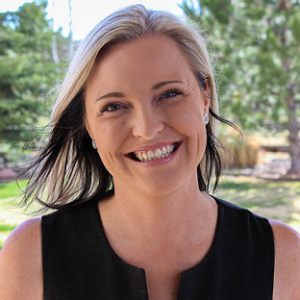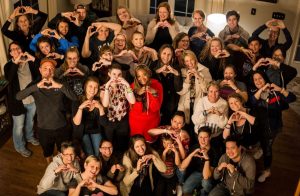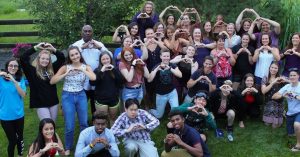From Trauma to Treatment: Heather Martin and Rebels Project
June 17, 2021 / by The “I Love U Guys” Foundation

Heather Martin, Co-Founder, The Rebels Project.
We had the chance to catch up with Heather Martin recently and we want you to meet her. We’re inspired by Heather’s story and her work with The Rebels Project — a non-profit that supports and connects survivors of mass tragedy and trauma with resources and education surrounding the varying effects of mass trauma. In addition to the lives she’s changing, her perspective can inform how we as school safety practitioners approach the aftermath of crises.
Heather is a survivor of the Columbine High School shooting, just two days away from her 18th birthday when it occurred. She has turned the trauma of that day, something that has impacted her throughout her life since, into a gift for many people. She co-founded The Rebels Project after the shooting at the Aurora, Colorado movie theater with other Columbine alumni. Now she speaks on and advocates for informed responses to traumatic events from the perspective of a survivor.
Thank you for sharing your time and experience with us, Heather. Can you tell us a bit about the Rebels Project?
The Rebels Project, named after the Columbine High School mascot, is a peer support network founded after the shooting at the Aurora Theater in 2012 by Columbine High School survivors. We founded it because we wanted to provide a resource that we didn’t have access to in 1999. Right now we have a private online Facebook group, we hold monthly support meetings, we travel to impacted communities, and we hold an annual gathering where we fly survivors out to Colorado from around the United States to be together for a week of healing.

Rebels Project survivors gathering, Parker, Colorado.
We also have a program called Project Journey that connects survivors to qualified therapists, typically specializing in EMDR (Eye Movement Desensitization and Reprocessing) therapy. Project Journey pays for therapy, especially long after the event because we noticed that Columbine survivors, even 10 to 15 years out, need support and they didn’t have access to it. Many didn’t have funds to help pay for the support.
We are the largest peer support network for mass trauma survivors in the United States, and we make sure that we are here for the long haul because we know that an event is only the beginning of the trauma, and if Columbine is any indicator our services are going to be needed for at least 22 more years.
Today we have 1,700 members that represent approximately 110 survivor communities from around the world.
Can you tell us a bit about your experience at Columbine, and how that is driving you to be involved in this work?
On April 20, 1999, I was a senior, and I was in choir class when the shooting started. It started at the beginning of 5th period, and a student came up the stairs, opened the choir room door, and said someone has a gun downstairs and they’re shooting. We kind of scattered, and a lot of the students ran out – but I didn’t for whatever reason, and I ended up barricaded in a 12’ by 30’ office with 59 other students for about 3 hours.
The SWAT team came and knocked on our door and pulled us out of the room, divided us into groups of 10, and let us out of the school where we were loaded into… kind of like SUVs, where they drove us to a place where we gave our statements. From there they bussed us to a local elementary school where our parents picked us up. My younger sister was a freshman during the shootings, and she got out fairly quickly and was waiting for me when I came home with my dad. She said that as I walked up the driveway that I looked like a shell of a person.
As a senior I only went back to the school to get my stuff—we finished at a neighboring high school. Basically all of us seniors graduated and went off into the world.
The struggles I went through in college are really what helped fuel the decision to start the Rebels Project. I ended up going to a local community college where I struggled for a long time. I didn’t want to tell anyone that I was from Columbine because people would ask really insensitive questions. I didn’t have anyone I could talk to about it, and I didn’t want to tell anyone I was there because they wouldn’t get it. I was also worried they would judge me for still struggling since I wasn’t physically injured.

Rebels Project survivors gathering, Parker, Colorado.
There were times when I was blindsided by triggers. One time that stands out was when I was in my English class and the fire drill went off. I immediately started crying. I had completely forgotten that the fire alarm was going off the entire time I was barricaded in the Columbine choir office. So here I am surrounded by strangers in college who have no idea what I went through and they just think I’m some weird person that cries at fire drills.
I remember feeling lonely and anxious and embarrassed about still being impacted, still struggling, and still having nightmares. Still, it took me 10 years to finally call myself a survivor.
So essentially, this idea that I didn’t have anyone to connect with or talk to about what I was going through, I go back to all the time as I do my work with the Rebels Project now. Now my hope is to validate some of those feelings and give a realistic idea to maybe newer survivors of what this recovery Journey might look like for them.
How do you think we can all handle recovery from incidents like you experienced, and what can we do better?
We need to not pressure survivors to “get over it” or put any kind of timeline on anyone’s healing or anyone’s recovery. This kind of pressure is really damaging because survivors put it on themselves anyway. In their head…they want to get over it while not understanding why they’re still feeling the way that they do. The pressure that we feel sometimes is imagined, honestly. So for society to expect us to move on is really damaging to our recovery.
We also need to rethink our ideas and labeling of what a survivor is and is not, and who has the right to feel impacted or traumatized or not. As a physically uninjured survivor, I didn’t feel like I had a right to be traumatized, that there were a bunch of people who had it worse than me. So I minimized my trauma by telling myself “well at least I didn’t see this” or “at least I wasn’t shot. And that was really dangerous for my recovery and my journey.
Society kind of gives the impression that if you weren’t physically injured or if you were in a certain spot during a shooting that you shouldn’t be impacted, that you shouldn’t be traumatized. That’s just not the case. That’s not real. I think external judgments keep survivors from confronting their trauma or their experience. To me, that’s when outside problems are going to manifest, and it’s going to show up in your private and professional life. Things just fracture out from there.
So trauma seems to be a much wider concept than many of us understand. What do we need to do to broaden our awareness?
We all really need to consider the ripple effect of trauma. It’s not just the people who were at the epicenter of the event that are impacted. The stories that get the most coverage and public acknowledgment are the ones that are the most sensational. But the truth is there are an incredible amount of people traumatized in different ways after these events.
You’ll hear people say “oh I know someone who went to Columbine,” or “I know someone who almost went to the theater the night [of the Aurora theater shooting].” In our minds, we might be really shaken but somehow we feel like we don’t have a “real” reason to. We draw these connections to the event and people who were there in order to justify our feelings to ourselves or others. Deep down, we all share a small bit of trauma from these events, and the ripple effect is much farther reaching than what we grapple with.
Another important lesson I’ve learned, not only in my own journey but as I talk with survivors from around the country, is that there is no timeline. Each survivor will have a unique journey. Checking in with people impacted months and years after the event can make a tremendous difference. Frank DeAngelis, our principal, made a concentrated effort to reach out to the class of ‘99 for the 10-year mark in 2009. We finally went back into Columbine, and that experience changed the trajectory of my healing. After that day, I decided to go back to school and get my teaching license. After that day, I was able to reconnect with people who understood me and my experience, people I didn’t have to explain myself to.
What’s the one piece of advice you’d like to offer someone healing from their own trauma?
Don’t compare your experience to anyone else’s. I did this a lot. I kept telling myself “Well at least I wasn’t shot” or “ I didn’t see the gunmen—I was barricaded in a room.”
But the truth is, even though I didn’t see the event really unfolding I saw a lot of the aftermath. I was still traumatized. I wouldn’t let myself recognize it, wouldn’t recognize that my experience was somehow traumatizing enough. And it took me to some really dangerous places.
What do you want law enforcement, first responders, and other school and community safety practitioners to understand from a survivor’s perspective specific to the response after an event like what you experienced?
Again, that idea of connecting with others after these events is key. And one thing that has been life-changing for me has been connecting with the first responders. They also experienced trauma. Meeting up and hearing about their experiences has helped me fill in some gaps that I used to have nightmares about. It’s helped me realize a lot of my trauma has been suppressed.
A consideration for first responders: many of us do remember our interactions, especially if they are harsh. After the shooting, I sat on the grass waiting to give my statement after hugging my second-period teacher who had blood on her shirt. A first responder snapped at me to calm down and just breathe (I was hyperventilating, I assume). I also recall the SWAT team cursing at us. Hearing the stories of the first responders at Columbine changed the way I thought about those interactions.
Anyone can download our safety programs at no cost—not even an email—on our website. The “I Love U Guys” Foundation offers in-depth training and presentations for school safety gatherings, both remote and in person. Contact us for more details.
Learn more about The “I Love U Guys” Foundation, and follow the conversation on Facebook and Twitter.
Categories: All
Written by The “I Love U Guys” Foundation